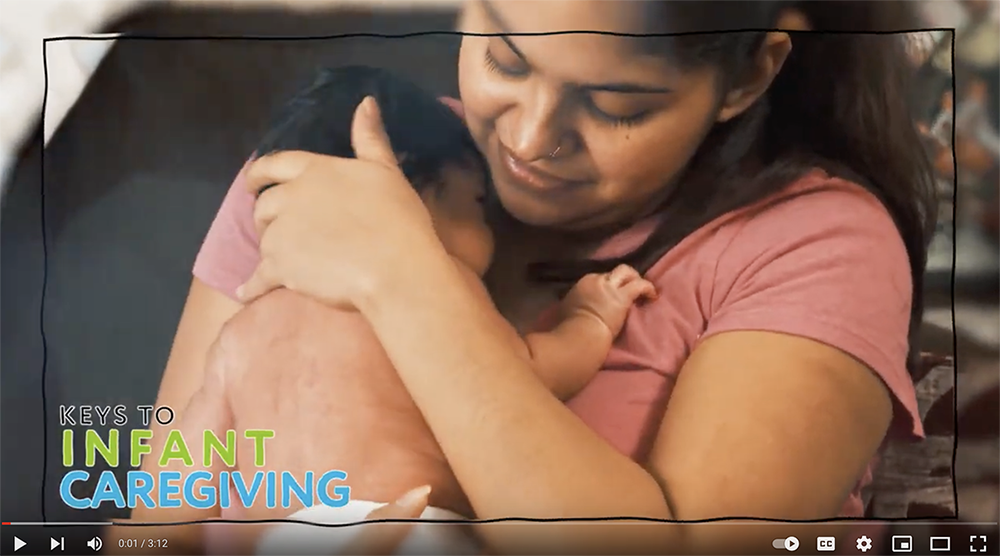
E-learning

Keys to Infant Caregiving E-Learning Course
In 1990, Dr. Kathryn Barnard and the team at NCAST Programs released the ground-breaking and award-winning Keys to Caregiving program. The program is used worldwide, giving health care professionals the knowledge to empower parents in caring for their infants.
In our new e-learning Keys to Infant Caregiving individual learner course there is all new video footage, quicker paced content, and a greater range of ethnic and racially diverse families. As a bonus, some of the most valuable archival footage is included for additional learning. The new educational series provides readily accessible content for both professionals and other care providers.
Keys teaches professionals about infants and their captivating ability to interact and engage in relationships with their parents and caregivers and how that impacts the care they receive. There are 5 classes in this course.

The first three classes provide foundational information about infant state, infant behavior, and how even newborn babies communicate their feelings and needs non-verbally. The last two classes consolidate this information and provide practical skills on waking a baby up and how to calm them down, and ways to enhance the developing parent-child relationship during feeding time.
The companion Study Guide offers deeper background information and contains structured areas to reflect upon and implement the new content in your practice
Keys is a research-based educational program for professionals that provides essential information on newborn and infant behavior.
Promoting First Relationships in Pediatrics E-Learning Course
This course includes 30 videos of parent-child interactions to help participants see and feel the elements of responsive caregiving. Parent Handouts, Provider Tip Sheets and Promoting First Relationships (PFR) Connecting Strategy Sheets for Well Care Visits through age 2 are included.

The course is
comprised of 9 Chapters
-

1. Introduction
-

2. PFR Approach to Relationship-Focused Care
-

3. Social Connectedness: The Importance of Children’s First Relationships

4. Elements of a Healthy Relationship
Understanding Cues to Support Responsive Caregiving
Alleviation of Distress
Elements of a Healthy Relationship
Mutuality
-

5. Feeding, Sleep and Development Viewed Through a Relational Lens
-

6. Understanding Children’s Behavior as their Language of Distress
-

7. Reframing Challenging Behavior: It’s All About Being Connected
-

8. Challenging Behavior Cases
-

9. Supporting Relationship-Centered Care in Primary Care
Promoting First Relationships in Pediatrics is designed to help providers and members of a multidisciplinary care team learn how to nurture and support the parent-child relationship during everyday clinic interactions with families and children.
Need a Free In-Service Idea?
Watch this free video with your team and discuss the use of the Eat/Sleep/Console strategy.
Supporting Women with Substance Use Disorders and their Newborns
Learn how to support women with substance use disorders —and their newborns. This FREE 45-minute video is narrated through a trauma-informed lens and supports the Eat, Sleep, Console model of care. Also, listen for the impact that a strengths-based practice can have on the families you serve. This compelling and informative video follows two women—one in recovery, and the RN who cared for her at the hospital.
Parent-Child Relationship Programs, with Dr. Ira Kantrowitz-Gordon, developed this video to promote compassionate, quality care for mothers with Opioid Use Disorder (OUD) and their newborn infants with NOWS (Neonatal Opioid Withdrawal Syndrome).
Data shows a significant national rise in OUD and babies with NOWS presenting at hospitals for labor and delivery. Dr. Kantrowitz-Gordon and Dr. Rizza Cea, both registered nurses, are the video instructors.
Questions?
Please give us a call
We look forward to talking with you!
-
Phone
206-543-8528
-
Business hours
Monday – Friday
7:30am – 4pm
-
E-mail
pcrp@uw.edu
-
Mailing Address
Parent-Child Relationship ProgramsUniversity of Washington - Box 357231
Seattle, WA 98195-7231
-
Office Address
Parent-Child Relationship ProgramsUniversity of Washington
Health Sciences Building F-346
Seattle, WA 98195-7231
Prefer exploring on your own?
Check out our FAQ section
for answers to common questions
WE WANT TO CONNECT WITH YOU!
Feel free to fill out our contact form or call us at 206-543-8528



